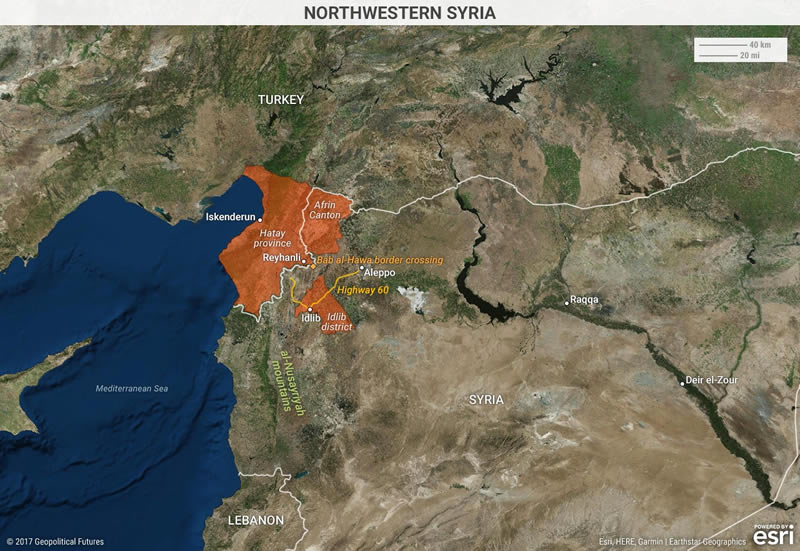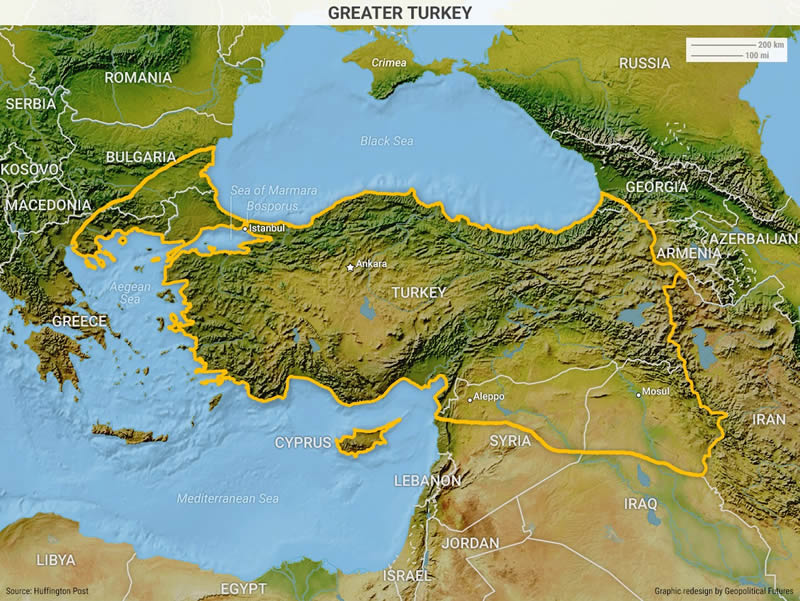Here’s Why Turkey Can’t Stay Out Of Syria
Politics / Middle East Sep 25, 2017 - 04:57 PM GMTBy: John_Mauldin
 By Jacob L. Shapiro, Mauldin Economics : Turkey has tried not to be involved in Syria since the Syrian civil war began.
By Jacob L. Shapiro, Mauldin Economics : Turkey has tried not to be involved in Syria since the Syrian civil war began.
Instead, it preferred to work diplomatic angles or prop up proxies on the ground. But unseen forces keep pulling Turkey into Syria. Forces that date back to the times of the Byzantines and Ottomans.
It appears that the Turks can no longer resist, and that their security demands a more hands-on approach.
(We’ll be addressing this very topic at our upcoming New York conference—you can learn more here.)
Turkish Forces Have Begun Massing on the Southwestern Border with Syria
As many as 80 military vehicles, including an unknown number of tanks and medical aid trucks, were dispatched to a part of Hatay province that’s roughly 30 miles (50 kilometers) from the border.
Another convoy of an unspecified number of military vehicles was reportedly sent to another area of Hatay, just two miles from Syria’s border, and a third group of 20 army vehicles was seen close to the border near Bab al-Hawa in Syria, about seven miles from Reyhanli.

By themselves, these movements might seem not important. It is, after all, normal for Turkey to move soldiers and material around its borders depending on where it believes threats could arise. But context is everything, and the context of these deployments is not routine.
Turkey, Iran, and Russia Have Split Up Syria
On September 15, Turkey, Iran, and Russia agreed in Astana to set up a safe zone in Syria’s Idlib province, just west of Aleppo. They reportedly agreed to divide the province into three zones, each controlled by a different country.
That same day, a pro-government Turkish newspaper reported that 25,000 Turkish soldiers were preparing for deployment into Idlib province, with the goal of taking control of a roughly 2,000-square-mile (5,000-square-kilometer) area with over two million inhabitants.
Until now, Turkey has chosen to stay out of the fray in Syria as much as it can. However, the situation in northwest Syria has become complicated.
Syrian Kurds control Afrin Canton, much to Turkey’s chagrin. Hayat Tahrir al-Sham (formerly al-Qaida or al-Nusra Front) holds the city of Idlib, which it recently took from the Turkish-backed proxy Ahrar al-Sham, as well as territory on the Turkish border.
Anti-Assad rebel forces fell back to Idlib’s towns and countryside after losing the battle for Aleppo. And the Bashar Assad regime has not given up its ambitions to reconquer the territory.
The presence of so many different groups means there are almost as many outside powers with an interest in what happens in northwest Syria than inside powers.
This is an unstable situation that is trending toward a power vacuum. If Turkey doesn’t fill the void, someone else will, and none of the potential options are good for Turkey.
Greater Turkey
This isn’t just a modern problem: Previous Bosporus-based powers have faced the same threat from the south. The Ottomans—and the Byzantines before them—at various points in their history extended their writ into parts of present-day Syria.
It is no coincidence that various Turkish media and even President Recep Tayyip Erdogan himself have referenced the “National Pact” in recent years. The map below shows what the National Pact’s “Greater Turkey” might have looked like superimposed on the region’s present-day borders.

One of the things to notice on this map is the geographic advantage that control of northwestern Syria would give to Turkey. Under the new agreement with Russia and Iran, the zone that Turkey has been approved to enter includes mountainous territory that would allow Turkey to control the high ground against any would-be enemy seeking to cross the border.
Idlib, meanwhile, is important because it is located near a small pass between the al-Nusayriyah mountains, core Alawite and Assad regime territory, and the flatter plains dominated by Sunni Arabs. If Turkey controlled Idlib, it could control this pass, as well as significant chunks of Highway 60, which it could use to reinforce its proxies nearby.
Controlling the side of this valley pass on the Syria side would make it easier to defend the southern approach to Turkey’s coastal sliver that abuts Syria’s western border. It also would put Turkey in a much better position to project power in the fights to come over Syria’s future.
Turkey has had an interest in controlling this territory since it was taken away from the Ottomans in 1923—what it lacked was the capability and the opportunity to change the situation. It now has both.
Proxies won’t do here. Turkey’s long-term security is at stake, and Turkey possesses capabilities sufficient to the task at hand. So despite the desires of the government in Ankara, Turkey is being drawn into Syria. It is not the first time and it will not be the last time.
Grab George Friedman's Exclusive eBook, The World Explained in Maps
The World Explained in Maps reveals the panorama of geopolitical landscapes influencing today's governments and global financial systems. Don't miss this chance to prepare for the year ahead with the straight facts about every major country’s and region's current geopolitical climate. You won't find political rhetoric or media hype here.
The World Explained in Maps is an essential guide for every investor as 2017 takes shape. Get your copy now—free!
John Mauldin Archive |
© 2005-2022 http://www.MarketOracle.co.uk - The Market Oracle is a FREE Daily Financial Markets Analysis & Forecasting online publication.



